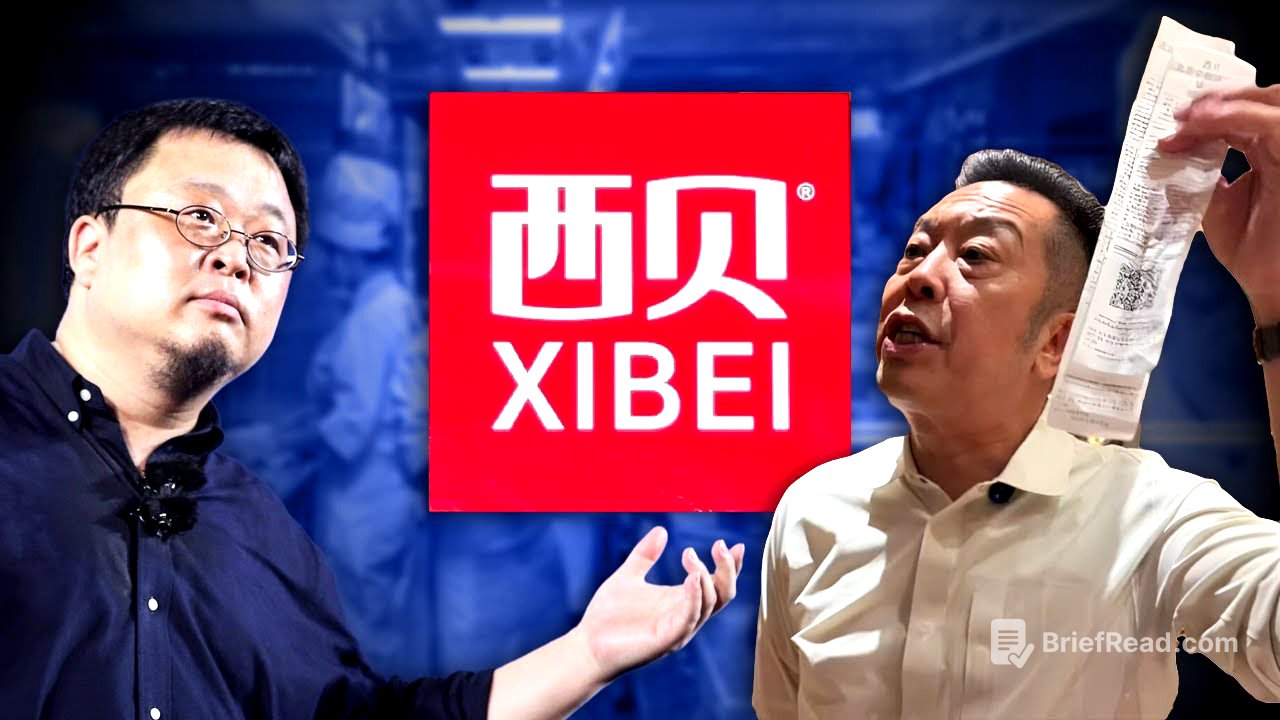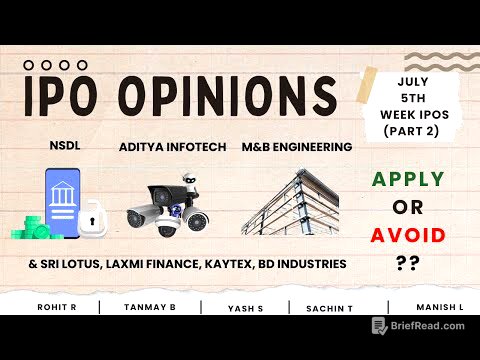TLDR;
This YouTube video segment, "What's Up Beijing," investigates a major social media controversy in China involving the restaurant chain JBE (the "Chili's of China") and a popular influencer. The conflict arose from accusations of pre-made food and inflated prices, leading to a significant PR crisis for JBE as it approaches its IPO. The video details the back-and-forth between the influencer and the CEO, the public's reaction, government involvement, and the ultimate fallout, highlighting the power of social media and changing consumer expectations in China.
- JBE, a popular Chinese restaurant chain, faces a PR crisis due to accusations of serving pre-made food and overpricing.
- A social media war erupts between an influencer and JBE's CEO, escalating into a major public controversy.
- The Chinese government and state media side with the influencer, emphasizing the need for transparency about pre-made food.
- JBE's attempts to defend itself backfire, leading to declining sales and a rebrand effort.
- The incident reflects a shift in China's consumer culture, where transparency and customer feedback are increasingly important.
Introduction: What's Up Beijing [0:00]
The segment "What's Up Beijing" returns with an investigation into a significant story from China, focusing on the fast-casual dining market. The discussion centers around JBE, a restaurant chain similar to Chili's in the U.S., known for its fresh, family-friendly dining experience. The story involves a conflict that combines elements of government influence, CEO actions, social media influencers, and consumer sentiment, highlighting the dynamics of the Chinese market.
Introducing JBE: The Chili's of China [1:25]
JBE is described as a popular fast-casual restaurant chain in China, emphasizing fresh, home-cooked Chinese food for families. With hundreds of stores and thousands of employees, JBE is nearing a major IPO. The restaurant is known for its family-friendly atmosphere, kids' menu, and open-concept kitchens, which highlight the freshness of its food.
The Key Players: Lu Yong Ho and Chia Guong [2:21]
The segment introduces two key figures in the unfolding controversy. Lu Yong Ho, a former struggling teacher turned tech founder and later a successful live streamer, is known for his sometimes controversial opinions and large social media following. Chia Guong is the CEO of JBE, who has built the company over 30 years to include 400 locations and 20,000 employees, with a major IPO planned for 2025 or 2026. Chia Guong views JBE as the future McDonald's of China, aiming for a global presence.
The Conflict Begins: A Negative Dining Experience [4:36]
The conflict starts when Lu Yong Ho visits JBE and posts on social media about his negative experience, criticizing the pre-made nature and high cost of the food. This post quickly goes viral, resonating with many users who feel the prices at JBE do not match the quality. While social media trends often fade quickly, this particular complaint gains significant traction.
CEO's Response: Defensiveness and a Bold Claim [6:18]
In response to the influencer's criticism, the CEO of JBE takes to social media to defend his company. He questions why Lu Yong Ho ordered so many dishes if he disliked the food and announces plans to sue him. To further prove his point, the CEO declares that all JBE kitchens will be opened to the public for inspection and introduces a new menu item named after Lu Yong Ho without permission.
The Influencer Strikes Back: A Bounty is Offered [8:01]
Instead of backing down, Lu Yong Ho intensifies his attack, posting frequently about the negative quality of JBE's food and sharing posts from others with similar experiences. He offers a 100,000 yuan bounty (approximately $15,000 USD) for anyone who can provide legal evidence that JBE's dishes are pre-made. This escalates the social media war, drawing even more attention to the controversy.
Kitchen Inspections: Damning Discoveries [9:49]
Following the CEO's open invitation, people begin inspecting JBE kitchens and discover expired ingredients, including frozen broccoli and a year-old marinated lamb leg. These findings go viral on social media, further damaging JBE's reputation. Consumers express their frustration with expensive, pre-made dishes, especially given JBE's marketing as fresh and healthy.
CEO's Clarification and Further Backlash [11:46]
The CEO attempts to clarify his earlier statements, explaining that while the food is "pre-repped," it is not "pre-made" according to the strict legal definition. This explanation fails to appease the public, who feel that JBE's practices contradict its marketing and pricing. Lu Yong Ho then sends the CEO the 100,000 yuan bounty, highlighting the CEO's admission of using pre-prepared ingredients.
Government Intervention and Public Sentiment [14:15]
The Chinese government and state media weigh in on the controversy, siding with the influencer and emphasizing the importance of transparency regarding pre-made food. This solidifies the influencer's victory and intensifies the meme war against JBE. An attempt by JBE to garner sympathy by sharing a story about a child upset that they can't eat at JBE backfires, further infuriating the public.
JBE's Apology and Continued Damage Control [15:37]
JBE finally issues an apology, promising to improve its menu and reduce pre-prepared dishes, particularly in the kids' menu. However, a leaked group chat message reveals the CEO privately criticizing the influencer, undermining the sincerity of the apology. The controversy leads to a significant drop in JBE's daily turnover and a rebrand effort focused on health and freshness.
Aftermath: New Regulations and a Shift in Consumer Culture [18:26]
The Chinese government responds by drafting new regulations requiring clear labeling of pre-made food. The incident highlights a shift in China's consumer culture, where transparency, customer feedback, and social media influence are increasingly important. The CEO's traditional approach of ignoring customer concerns and pushing through is no longer effective in this new landscape.
Viral Content in China: Road to Empress [19:51]
The segment concludes with a brief mention of the game "Road to Empress" and how foreign reactions to it, particularly those of streamers like Lwig and Northern Lion, are going viral in China. Chinese viewers are amused by the cultural interpretations and pronunciation of the game's content by foreign players.





![30 Day Plan to Master Your Communication [Complete Beginner’s Guide] + FREE Workbook PDF](https://wm-img.halpindev.com/p-briefread_c-10_b-10/urlb/aHR0cDovL2ltZy55b3V0dWJlLmNvbS92aS9VNDBxdlVpZWZRby9ocWRlZmF1bHQuanBn.jpg)



